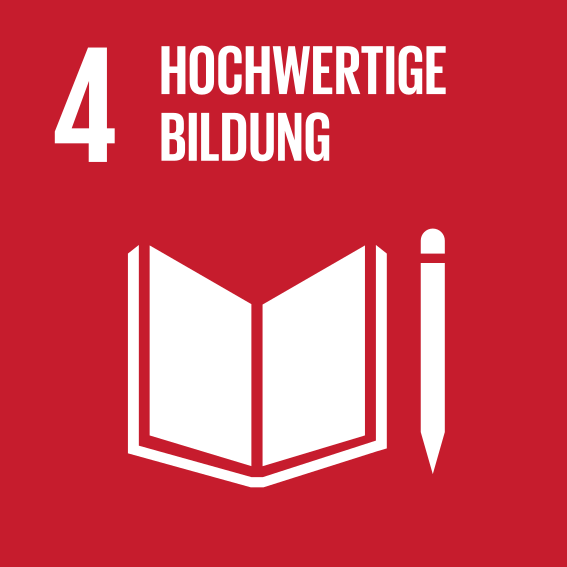|
Empowering schools in socially disadvantaged areas and tomorrow's teachers: A German service-learning seminar's experiences
Yendell, Oscar
;
Thielmann, Merle-Sophie
;
Derkau, Julia

|
Dokumenttyp:
|
Präsentation auf Konferenz
|
|
Erscheinungsjahr:
|
2024
|
|
Veranstaltungstitel:
|
7th European Conference on Service-Learning in Higher Education (ECSLHE 2024) - Transforming Europe through University Collaboration
|
|
Veranstaltungsort:
|
Palma, Mallorca, Spain
|
|
Veranstaltungsdatum:
|
24.-25.09.2024
|
|
Verwandte URLs:
|
|
|
Sprache der Veröffentlichung:
|
Englisch
|
|
Einrichtung:
|
Fakultät für Sozialwissenschaften > Unterrichtsqualität in heterogenen Kontexten (Karst 2023-)
|
|
Fachgebiet:
|
370 Erziehung, Schul- und Bildungswesen
|
|
Abstract:
|
In service-learning, students apply theoretical knowledge in real-world contexts, aligning problem solving with academic curriculum requirements (Bringle & Clayton, 2012). This combination promotes students' civic attitudes, critical thinking, and social responsibility while addressing societal challenges in collaboration with societal partners (Derkau & Gerholz, 2023). These objectives are particularly relevant to initial teacher education, so we developed a service-learning seminar on school improvement with schools in socially disadvantaged areas and preservice teachers. Successful improvement benefits schools in socially challenging locations, enabling them to meet various external challenges (e.g., High poverty rates or poor infrastructure) (Holtappels et al., 2021). Accordingly, preparing preservice teachers for their role in school improvement seems sensible, especially as the topic has hardly been addressed in teacher training to date. To fulfil these requirements, our service-learning seminar introduced preservice teachers to school improvement processes from a theoretical and practical perspective.
The preservice teachers were first introduced to academic discourses on diversity-oriented school improvement and the specific challenges for school improvement faced by schools in socially disadvantaged locations (Kaluza & Schimek, 2021). Various areas of diversity-orientated school development were discussed, such as lesson planning, diversity sensitivity among teaching staff, and cooperation with stakeholders in the school's social environment. At the same time, they were trained in designing posters using appropriate software.
Preservice teachers then visited schools in socially disadvantaged areas that had applied to participate with selected school improvement projects. During the visits, the students learned about those projects and created posters describing them and situating them in the academic discourse on school improvement. These posters were then presented to members of the university, members of the participating schools, and other students at a poster conference. The preservice teachers received feedback on their posters, which they then incorporated. The participating schools could also exchange information about their school improvement projects. The participating schools then received the revised posters, which they could use to promote their school to parents, future pupils, authorities, or cooperation partners. In the context of the seminar, the students also discussed their experiences during school visits. They reflected on their experiences and discussed the significance of their experiences for their future roles in school improvement projects.
As part of the conference presentation, the seminar concept and first results of the students' reflection process will be shared. The focus will be on qualitative content analysis (Mayring & Fenzl, 2019) of written reports submitted by the preservice teachers. Additionally, the results of a discussion phase will be presented, during which teachers, university staff, and students debated how service-learning concepts can succeed at schools in socially disadvantaged areas. The combined results will be discussed in the context of how successful service-learning concepts can be developed for schools in socially disadvantaged areas and preservice teachers.
|

 | Dieser Eintrag ist Teil der Universitätsbibliographie. |
 Suche Autoren in Suche Autoren in
Sie haben einen Fehler gefunden? Teilen Sie uns Ihren Korrekturwunsch bitte hier mit: E-Mail
Actions (login required)
 |
Eintrag anzeigen |
|
 ORCID: 0000-0001-9432-0328 ; Thielmann, Merle-Sophie
ORCID: 0000-0001-9432-0328 ; Thielmann, Merle-Sophie  ORCID: 0000-0003-4722-8080 ; Derkau, Julia
ORCID: 0000-0003-4722-8080 ; Derkau, Julia  ORCID: 0000-0001-7758-054X
ORCID: 0000-0001-7758-054X





 Suche Autoren in
Suche Autoren in